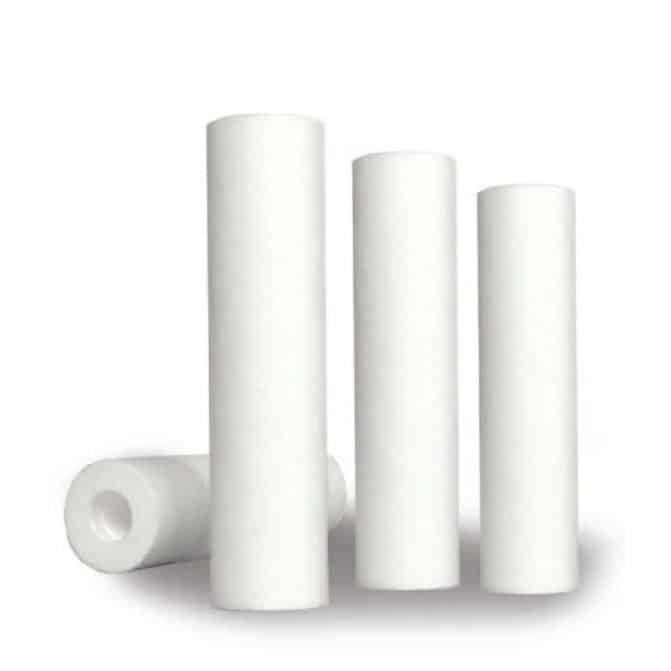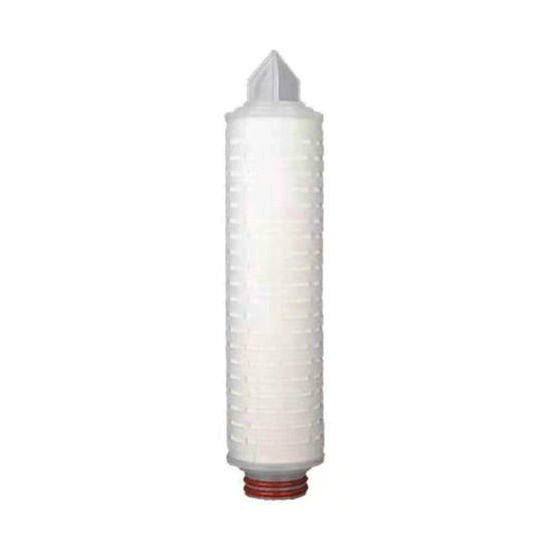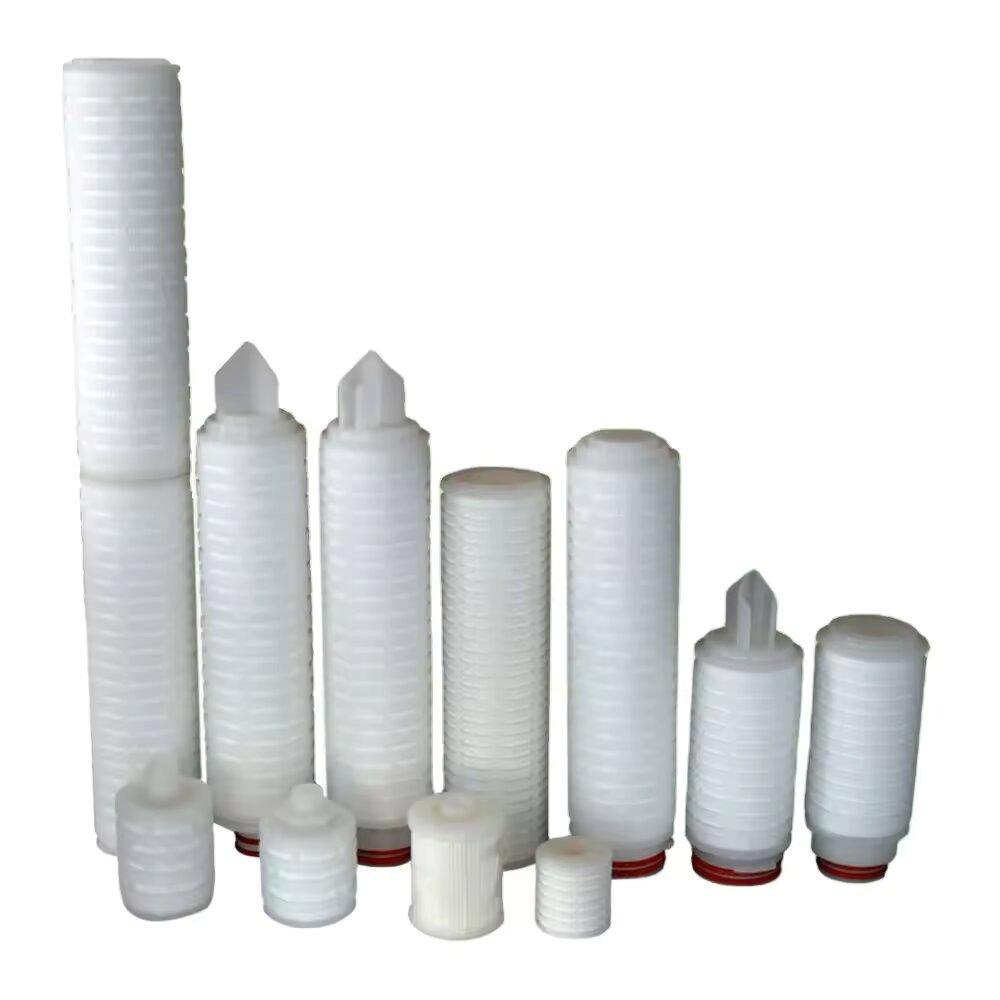Beer Filter Cartridge for Beer Brewing Filter System
Introduction to Beer Filtration in Modern Brewing
Beer brewing has evolved significantly over the past few decades, with breweries—both craft and large-scale—paying close attention to the quality, clarity, and stability of their beer. One of the most critical aspects of brewing is beer filtration, a process that removes unwanted particles, yeast, and haze from beer before packaging.
A beer brewing filter is an essential piece of equipment for achieving the desired taste, clarity, and shelf life of beer. Within this process, the beer filter cartridge plays a central role. The cartridge ensures that only desired components—flavor compounds, aroma molecules, and color—pass through, while unwanted solids and microorganisms are removed.
In this article, we will explore everything you need to know about beer filter cartridges for beer brewing filter systems, including how they work, their advantages, and how to choose the right type for your brewing operation
1. What is a Beer Filter Cartridge
A beer filter cartridge is a replaceable cylindrical filtration element that fits inside a beer filter housing within a beer filter system. It acts as a physical barrier, trapping yeast cells, proteins, and other haze-forming particles during the beer filtration process.
These cartridges are designed with precise micron ratings to achieve a specific level of filtration, from coarse particle removal to fine microbial stabilization.
Key Functions of a Beer Filter Cartridge
Clarification: Removing haze-causing particles for a crystal-clear appearance.
Stabilization: Extending beer shelf life by removing microorganisms.
Consistency: Maintaining batch-to-batch quality in beer production.
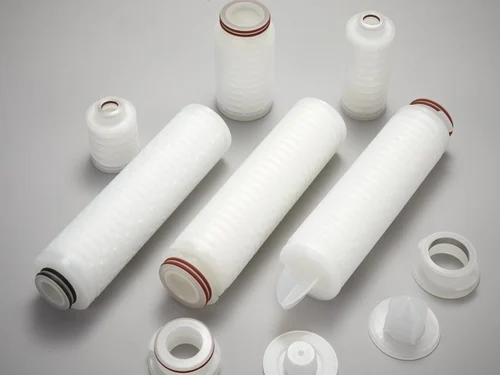
2. The Role of Filtration in Beer Brewing
Beer filtration is not just about aesthetics—it’s also about flavor stability and microbiological safety. Even though some craft brewers opt for unfiltered beer, most commercial brewing operations use a beer brew filter to ensure consistent quality and prevent spoilage.
Why Filtration Matters in Brewing
Shelf Life Extension: Removing yeast and bacteria prevents secondary fermentation in the bottle or keg.
Flavor Control: Eliminating unwanted particles prevents off-flavors caused by oxidation or contamination.
Market Appeal: Consumers often associate clarity with quality, especially in lagers and pilsners.
Where the Beer Filter Cartridge Fits In
The beer filter cartridge is part of the final stage in a beer filter system, often following rough filtration methods like diatomaceous earth (DE) filtration or plate-and-frame filters. This ensures that the beer meets packaging standards.
3. Types of Beer Filter Cartridges
Not all cartridges are created equal. Different breweries use different beer filters depending on the beer style, production volume, and desired level of clarity
Made from polypropylene, cellulose, or other fibrous materials.
Capture particles throughout the entire depth of the filter media.
Suitable for pre-filtration in beer production.
Feature folded media that increases surface area.
Provide higher flow rates and longer service life.
Ideal for fine filtration in a beer filter system.
Applications: Final clarification before packaging.
Made from advanced materials like PES (polyethersulfone) or PVDF.
Designed for microbial stabilization—removing bacteria and yeast without affecting flavor.
Often used as a replacement for pasteurization in modern brewing.
Applications: Craft breweries and large-scale producers seeking cold, sterile filtration.
4. How Beer Membrane Filters Improve Brewing Quality
The beer filter is gaining popularity because it avoids heat treatment, which can negatively affect beer flavor and aroma.
Advantages Over Pasteurization
Better Flavor Retention: No heat means no cooked taste.
Energy Savings: Reduced electricity costs compared to thermal processing.
Environmental Benefits: Lower carbon footprint.
How It Works
A beer membrane filter operates by passing beer through a fine-pored membrane with a pore size typically around 0.45 μm or smaller, effectively removing microorganisms while allowing all flavor and aroma compounds to pass
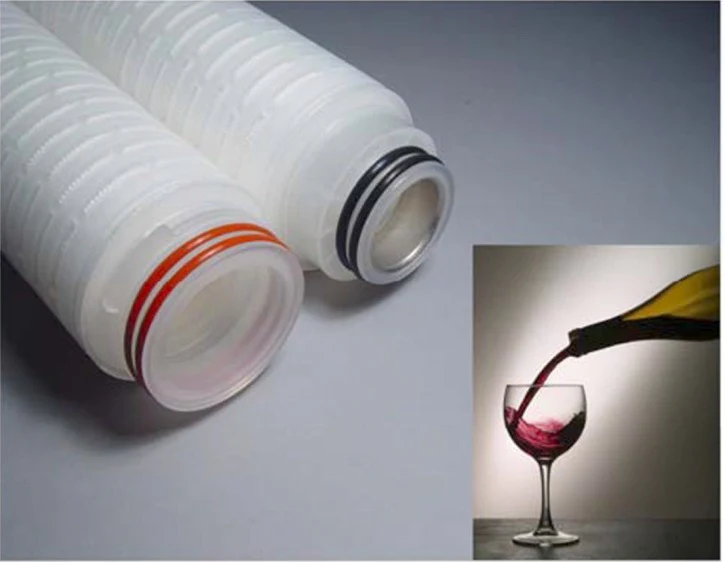
5. Choosing the Right Beer Filtration System
A beer filtration system is the complete unit that holds, seals, and operates multiple beer filter cartridges. Choosing the right one depends on:
Key Considerations
Production Capacity: Larger breweries require systems that can handle higher flow rates.
Beer Style: Unfiltered IPAs may use different filtration than clear lagers.
Regulatory Requirements: Some countries require specific microbial counts for packaged beer.
Budget & Maintenance Costs: Cartridge replacement frequency affects operational costs
6. Beer Water Filter – Ensuring Brewing Water Quality
Brewing starts with water—often overlooked but critically important. A beer water filter ensures that incoming brewing water is free from chlorine, chloramine, sediment, and off-flavors.
Why Water Filtration Matters
Flavor Consistency: Water composition impacts beer taste.
Protecting Brewing Equipment: Prevents scale and corrosion in tanks and piping.
Supporting Fermentation: Removes harmful contaminants that can affect yeast health.
7. Step-by-Step Beer Filtration Process
Here’s how a typical brewery integrates a beer filter cartridge into their workflow:
Pre-Filtration: Large particles removed using coarse filters.
Intermediate Filtration: Depth filter cartridges remove haze-forming proteins and yeast.
Final Filtration: Pleated or membrane cartridges achieve final clarity and microbiological stability.
Packaging: Filtered beer is filled into bottles, cans, or kegs.
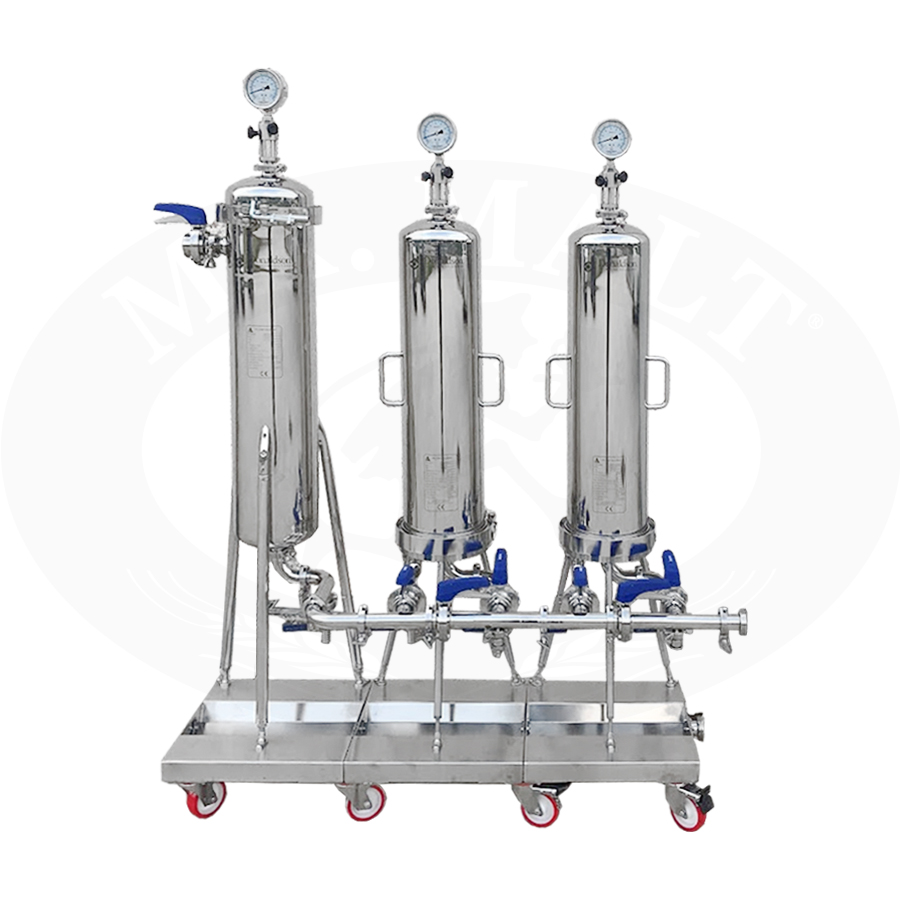
8. Comparing Beer Filter Cartridges for Different Beer Styles
Different beer styles require different filtration approaches, and the choice of a beer brewing filter depends on whether the beer should be brilliantly clear, slightly hazy, or completely unfiltered.
8.1 Lagers and Pilsners
Goal: Brilliant clarity, extended shelf life.
Recommended Cartridge: Pleated filter cartridge followed by a beer membrane filter.
Why: These beer styles demand a crisp, clean appearance with no haze.
8.2 Wheat Beers and Hefeweizens
Goal: Maintain a natural haze for authenticity.
Recommended Cartridge: Coarse depth filter cartridge to remove unwanted solids while preserving yeast haze.
Why: Over-filtration can strip the beer of its signature cloudy look.
8.3 IPAs and Hop-Forward Beers
Goal: Retain hop oils and aroma compounds.
Recommended Cartridge: Medium-micron pleated cartridge; avoid ultra-fine filtration unless stability is needed for export.
Why: Excessive filtration can reduce aroma intensity and mouthfeel.
8.4 Stouts and Porters
Goal: Maintain body while removing sediment.
Recommended Cartridge: Depth filter cartridge for pre-filtration followed by fine pleated cartridge.
Why: These dark beers benefit from partial filtration to maintain richness.
9. Installation and Maintenance of Beer Filter Cartridges
Proper installation and regular maintenance of a beer filter system are critical for consistent results and food safety.
9.1 Installation Steps
Inspect Filter Housing: Ensure the housing is clean and free from debris.
Check O-Rings and Gaskets: Replace worn seals to prevent leaks.
Insert Cartridge Correctly: Follow manufacturer’s alignment guidelines.
Flush the System: Rinse with brewing water to remove air pockets and residual particles.
9.2 Maintenance Practices
Routine Inspection: Check pressure drop across the filter to determine clogging.
Sanitization: Use brewery-approved cleaning agents between batches.
Replacement Schedule: Replace beer filter cartridges according to the number of barrels processed or when flow rate drops significantly.
10. Cost-Benefit Analysis of Beer Membrane Filters
Switching to a beer membrane filter system may involve higher initial costs but can result in long-term savings and quality improvements.
Cost Considerations
Initial Investment: Membrane filters cost more than depth or pleated filters.
Operating Costs: Lower energy usage compared to pasteurization.
Cartridge Life: High-quality membranes can be cleaned and reused multiple times.
Benefits
Improved Flavor: No thermal degradation.
Environmental Impact: Reduced carbon footprint.
Regulatory Compliance: Meets strict microbial safety standards without heat treatment.
11. Troubleshooting Common Beer Filtration Issues
Even the best beer brewing filter system can encounter problems.
11.1 Slow Flow Rates
Cause: Clogged cartridge due to excessive solids.
Solution: Improve pre-filtration or replace cartridge earlier.
11.2 Loss of Carbonation
Cause: Over-filtration or excessive agitation.
Solution: Use appropriate micron size to retain CO₂.
11.3 Flavor Stripping
Cause: Using overly fine filtration for the beer style.
Solution: Match filter type and micron rating to beer style.
12. How to Choose the Best Beer Filter Cartridge Supplier
Selecting the right supplier for beer filter cartridges is as important as choosing the filter itself.
Qualities to Look For
Industry Experience: Specialization in brewing filtration.
Product Range: Availability of depth, pleated, and membrane filters.
Customization: Ability to provide specific micron ratings and materials.
Certifications: Compliance with food and beverage safety standards.
13. Integrating Beer Water Filters into the Brewing Process
Many brewers overlook the importance of a beer water filter before brewing even begins. The filtration of brewing water helps ensure that the final beer has consistent quality.
Steps for Effective Brewing Water Filtration
Sediment Removal: Use a sediment cartridge filter to eliminate suspended particles.
Chlorine/Chloramine Removal: Use carbon block cartridges to improve taste and protect yeast.
Mineral Adjustment: Filtered water allows brewers to precisely adjust mineral content for style-specific brewing.
14. Environmental Benefits of Cartridge-Based Beer Filtration
Modern beer filter systems that use cartridge technology are more sustainable than some traditional methods.
Eco-Friendly Aspects
Reduced Waste: Cartridges generate less waste than diatomaceous earth filtration.
Lower Energy Usage: Especially true with cold membrane filtration.
Water Savings: Efficient cleaning procedures reduce water consumption.
15. Frequently Asked Questions (FAQ)
Q1: What is the best micron size for a beer filter cartridge?
For final microbial stabilization, a 0.45 μm beer membrane filter is common. For pre-filtration, 1–5 μm cartridges are often used.
Q2: How often should I replace my beer filter cartridges?
It depends on beer style, solids content, and batch size. Many breweries replace them every 20–50 barrels, but membrane filters can last longer with proper cleaning.
Q3: Can beer membrane filters replace pasteurization?
Yes. Many breweries use cold membrane filtration instead of pasteurization to maintain fresh flavor while ensuring microbiological stability.
Q4: Do I need a beer water filter if I already have a beer brewing filter?
Yes. A beer water filter is for incoming brewing water, while a beer brewing filter is for filtering the beer after fermentation.
Q5: Will filtration remove too much flavor from my beer?
Not if you match the right cartridge type and micron rating to your beer style. Over-filtration is avoidable with proper planning.
Conclusion
A beer filter cartridge is a vital part of any modern beer filter system, ensuring that beer meets clarity, stability, and taste expectations. Whether you’re using a coarse depth filter for a hazy wheat beer or a fine beer membrane filter for sterile filtration, the right choice of cartridge can elevate your brewing quality and efficiency.
Pairing a beer brewing filter with a high-quality beer water filter ensures that both your brewing water and final beer meet the highest standards. By understanding cartridge types, filtration processes, and maintenance practices, breweries can optimize their operations while delivering consistently excellent beer.

